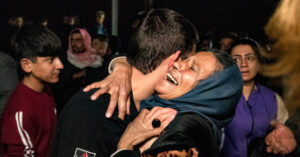The streets of Damascus were filled Thursday with civilians celebrating the flight of Bassar al-Assad to Russia in a development that ended more than 50 years of his family’s violent rule in Syria.
However, during the public funeral of Mazen al-Hamada, one of the best-known survivors of torture in the regime’s prisons before his disappearance in 2020, joy gave way to sadness. The country now has to face the fact that many of the 130,000 missing people may have been lost forever.
At an ensuing vigil in nearby al-Hijaz Square, thousands of men, women and children wept and hugged, often holding photos of their own missing loved ones. The initial euphoria that prevailed after survivors were discovered in prisons as anti-regime forces stormed Damascus has begun to fade. Many families, filled with anguish, searched prisons, morgues and resorted to archives and regime documents, but found no trace of their own people.
Still, this public expression of grief would have been unthinkable just a week ago, when Syria was still under police terrorism. The fall of the Assad regime has allowed people to publicly mourn their losses, express their collective grief and share their hope for justice.
Three shocking stories that highlight the brutality of the Assad regime
Mazen al-Hamada: The symbol of resistance
Among the many horror stories that have been revealed, the one of Mazen al-Hamada, an activist who lived and spoke out about the absolute brutality of the regime, stands out. Al-Hamada, one of the first anti-Assad protesters, was arrested in 2012 and suffered horrific torture for almost two years in Syrian government prisons. Among other things, he had described torture that included physical and psychological violence, and was forced to confess to crimes he did not commit.
His story became known through a documentary where he spoke about his experiences, hoping to raise awareness of the regime’s crimes in the international community. However, in 2020, returning to Syria under false promises, he was again arrested and disappeared. Just a few days ago, after the fall of the regime, his body was found in a Damascus hospital, a reminder of the regime’s latest acts of violence even shortly before its collapse.
Rania al-Abasi: The family tragedy
The story of Rania al-Abbasi, a dentist and former chess champion, is shocking in its horror and injustice. Al-Abbasi, a mother of six, was arrested in 2013 along with her entire family after a simple charitable act: providing aid to a family affected by the regime’s siege. Since then, she, her husband and her children, aged between one and 14, have never been seen again.
Her sister, Naila, has not stopped searching, calling every possible location and talking to anyone who could provide information about their whereabouts. Her efforts have led to international campaigns for Rania’s release, and her case has attracted the attention of organisations such as Amnesty International.
Despite her relentless efforts, she has been unable to uncover any clues about the family. As she says, “The tyrant is gone, but without justice there will be no peace.”
Tal al-Maluhi: A rare ray of hope
Amidst the darkness of stories of torture and disappearances, the release of Tal al-Maluhi is one of the few bright moments since the fall of the Assad regime.
Tal, a young blogger and poet, was arrested in 2009, at just 19, for writing poems about the political situation in Syria. She was falsely accused of spying for the United States and imprisoned after a secret trial.
Her case became a symbol of oppression in Syria, and human rights organizations and governments around the world called for her release. After the collapse of the regime, Tal was released and the first photos of her wearing a scarf with the colors of the Syrian opposition fill those who still believe in a free Syria with optimism. However, the wounds of years of imprisonment remain, and her rehabilitation will take time.





